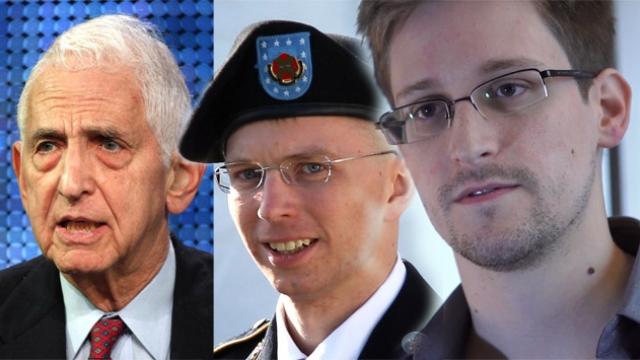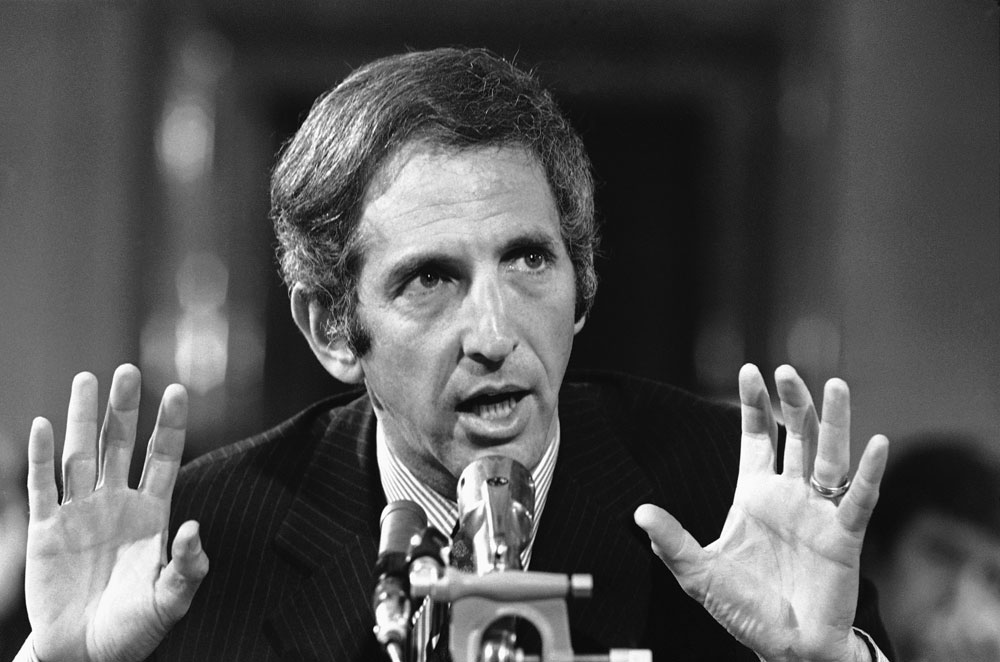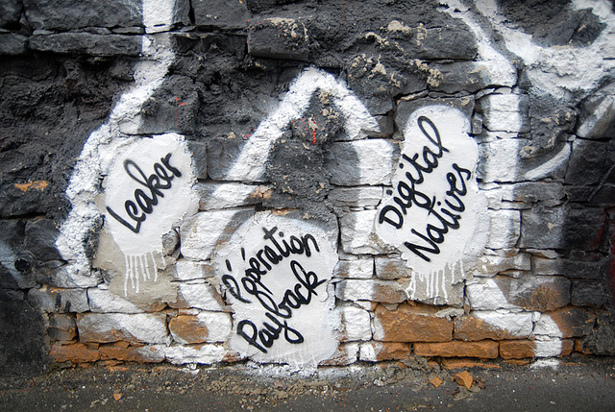
With computer technician Edward Snowden’s bombshell revelations about the extent of state snooping — coupled with the ongoing court martial of Private Bradley Manning — 2013 is the year of the whistleblower. These ongoing cases also highlight the perennial plight of the whistleblower along with the state’s enduring efforts to prosecute them as a means to reinforce rank and file obedience. Information has always been a battleground. But, in an age of networked communication, the whistleblowing game is changing what information is leaked and who has the opportunity to leak it. What has changed little are the consequences for those who dare to become whistleblowers.
Few aspects of our lives remain unaffected by the ascent of the information society. Equally, the NSA leaks suggest there are few aspects of our digital lives which are not subject to mass surveillance of some kind. WikiLeaks founder Julian Assange recently and accurately quipped that Facebook was “the most appalling spying machine that has ever been invented.”
The information hungry security-state cannot (yet) be run by computers alone. Its vast networks require architects, admins, analysts, auditors, developers, engineers and others. These high tech trades do not work exclusively for the government. Instead, many are brought into the fold in a neoliberal partnership where work is contracted out to multimillion dollar consulting companies and private security firms.
Nowhere is the scale of the security state more apparent than the vast numbers of people authorized to access classified information. For example, while the U.S. government will not confirm numbers, the BBC has conservatively estimated that “2.5 million U.S. military and civilian personnel” can access SIPRNET, the source of the Cablegate diplomatic cables. Thus Manning’s SIPRNET access — along with at least 2.5 million fellow security-cleared individuals — is not exceptional but typical of military work in the network society.
Whistleblowing is no longer the sole domain of key-holding, Harvard-educated elites at the top of the information food chain. Both Bradley Manning and Edward Snowden held low-level positions relative to their chain of command and security clearance. In a vast system where millions of government and contracted personnel have access to troves of data, leaking is an opportunity available to anyone with clearance, opportunity and motive.
In the age of Whistleblowing 2.0, not only are the whistleblowers different; the data is different too. Digital information is promiscuous. In the bygone days of analog leaking, paper memos or photograph negatives could be incinerated, leaving little evidence of their existence. While leaks can still come in the form of detailed secret reports, the may also appear as unwieldy datasets requiring specialized computer and analytical skills to unpack and interpret them.
As the Snowden case attests, leaks can also be as banal as a PowerPoint presentation. Yet, as Slavoj Žižek has argued, the value in such disclosures isn’t necessarily in their actual content — how surprising is it, really? — but in pushing the public to a point where it can no longer pretend not to know.
Aware of this fact, in 2008 the U.S. Army Counterintelligence Center penned a classified report on WikiLeaks — eventually, in turn, released by WikiLeaks — which stated: “Web sites such as Wikileaks.org use trust as a center of gravity by protecting the anonymity and identity of the insiders, leakers, or whistleblowers. The identification, exposure, or termination of employment of or legal actions against current or former insiders, leakers, or whistleblowers could damage or destroy this center of gravity and deter others from using Wikileaks.org to make such information public.”
In short: If you can’t denigrate the message, denigrate the messenger. Indeed, there has been no shortage of malicious misgiving lobbed at WikiLeaks’ Julian Assange; Vice President Joe Biden once likened Assange to a “high tech terrorist.” State efforts to defame the messenger are nothing new, and there are striking parallels with Daniel Ellsberg’s 1971 unauthorised leak of the Pentagon Papers.
Like Manning and likely Snowden to come, Daniel Ellsberg was charged under the 1917 Espionage Act. White House tapes released in April 2001 reveal that President Richard Nixon was keen to seek retribution in the Pentagon Papers case stating, on June 15, 1971: “Goddamn it. … Somebody has got to go to jail [pounding desk]. Somebody’s got to go to jail, that’s all there is to it. Our people here can’t just [unclear] anything about the war. … You’ve got to fight it.”
President Nixon also wanted to go beyond the criminal courts and try Daniel Ellsberg in the media, as an extract of a conversation between President Nixon, Henry Kissinger and U.S. Attorney General John N. Mitchell makes clear.
“We’ve got to get him,” Nixon said of Ellsberg. “Don’t worry about his trial. Just get everything out. Try him in the press. Try him in the press. Everything, John, that there is on the investigation, get it out, leak it out. We want to destroy him in the press. Press. Is that clear?”
Kissinger and Mitchell agreed. Nixon knew the information could not be discredited, so he had to discredit the messenger. At minimum, character assassination must also be anticipated. (In Assange’s case, his physical assassination was actually called for.) State power, especially for government workers, is premised on obedience. Thus Nixon wanted to send a clear message to any possible whistleblowers that they could expect the full force of the law if they followed their conscience instead of government codes of conduct.
In the midst of the unfolding leaks making headline news we must not lose sight of symbolism laden in the public shaming and punishment of whistleblowers. Manning’s prosecution in the public eye, and the yet-to-be-determined government response to Edward Snowden, will no doubt be constructed to visibly convey the seriousness of betraying state secrets. It is not only Bradley Manning who is on trial but the very act of leaking and whistleblowing. While the U.S. government is not seeking the death penalty in its charge of “aiding the enemy,” the thinly veiled public torture of Manning during his pre-trial detention, and his stalled and extended prosecution, are intended to make a brutal example out of him.
The Manning case must also be seen as symptomatic of the bigger crackdown by the Obama administration on the unauthorized leaking of information. His administration has charged an unprecedented six whistleblowers under the Espionage Act, double that of all past presidents combined. Moreover, the recent activities of the Department of Justice subpoenaing phone records from the Associated Press and the personal emails of journalists provide further evidence of the current administration’s stance towards leaking.
The fates of Bradley Manning and Edward Snowden remain to be determined. The one certainty in the Snowden case is that the Obama administration will not take his brazen act of leaking lightly. If anything, Snowden could put even more pressure on the court martial of Manning, a leaker whom the government at least has in custody. Manning faces a military court concerned only with the act of leaking and not the motivations behind it. And while a military judge will ultimately pass judgment on him, history will be another judge. Perhaps with the benefit of hindsight and having the fog of war lifted, Manning will be seen as following in the footsteps of the likes of Daniel Ellsberg, who has been one of Manning’s most high-profile public supporters.
Unlike Manning, Snowden purposefully stepped into the spotlight to take responsibility for leaking information with the public good in mind. Those who have watched the full interview between Snowden and Glenn Greenwald will have no doubt noticed the preemptive line of questioning designed to refute any future charge of aiding the enemy. Moreover, it clearly establishes Snowden as a textbook whistleblower. The outpouring of public support for him has indeed been encouraging.
As technology changes, the means, forms and faces of whistleblowers change, even while their value to a democratic society is clear. Being a whistleblower often comes with harsh consequences, yet what is even more dangerous is a society whose citizens are afraid to speak truth to power. From the Pentagon Papers to the PRISM leak, whistleblowers continue to play a vital role in keeping power in check. Long live the whistleblower.
3 WAYS TO SHOW YOUR SUPPORT
- Log in to post comments

















